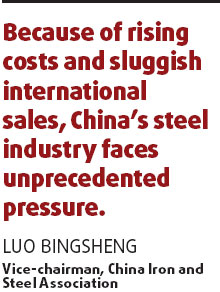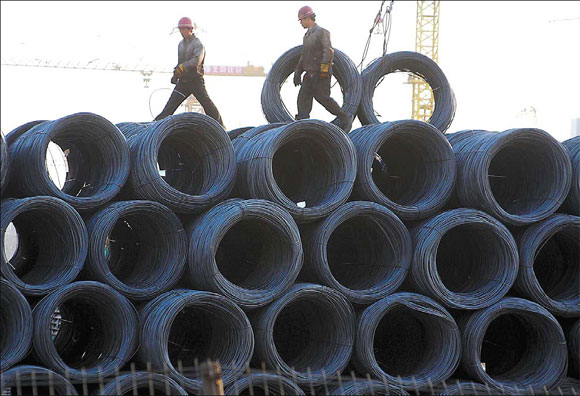Pressure mounts as costs keep rising
|
Workers at a steel marketplace in Beijing. File photo |
Qian Zong has more customers and more orders, yet his auto parts business saw a slump in profit this year.
"We are facing unprecedented pressure from rising raw material prices," Qian said. "Iron and steel prices are soaring, but we cannot raise our auto parts prices."
The manufacturer exports the bulk of its product to the United States, Russia and Japan. But Qian believes a price rise would see fewer orders.
Qian's company is not the only one that's feeling the pinch of rising raw material prices.
In Zhejiang's Shaoxing city, where the company is located, the higher cost of raw materials like steel, copper and aluminum is putting pressure on the machinery industry.
Manufacturers' raw materials costs rose 8 percent last year, but they raised product prices only 2 percent, according to a recent report by the Shaoxing development and reform commission.
"There's no good solution to offset rising raw material costs," Qian said.
In February, China's largest steelmaker Baosteel raised product prices by up to 20 percent for the second quarter on higher raw material costs and a projected increase in domestic demand.
Baosteel said in a statement it would raise the price of hot-rolled steel coils by 800 yuan per ton, or 20 percent, and cold-rolled steel by 16.7 percent, or 800 yuan per ton.
Earlier that month, Baosteel agreed to pay 65 percent more for iron ore to Brazil's Cia Vale do Rio Doce (CVRD) for the 12 months beginning April 1.
That price is in line with the benchmark agreed by Japanese and South Korean steel manufacturers.
"Because of rising costs and sluggish international sales, China's steel industry faces unprecedented pressure," Luo Bingsheng, vice-chairman of the China Iron and Steel Association (CISA), said.
Although Baosteel's production and sales continued to rise, it posted a drop in net profit growth of 2.74 percent for 2007.
China joined the global iron ore price negotiations in 2004. That year saw an 18.6 percent increase, followed by a 71.5 percent rise in 2005 and a 19 percent jump in 2006.
In 2006, China was the world's first major steel producer to settle with three mining firms - Brazil's CVRD and Australia's Rio Tinto and BHP Billiton - agreeing to a relatively modest hike of 9.5 percent for the year beginning April 2007.
Analysts said the rising iron ore price could trigger a domino effect, first pushing up iron and steel costs, then causing hikes in industries like cars and home appliances.
Bigger steelmakers can maintain margins by raising prices, but for small- and medium-sized companies, a price hike of iron ores like that means plummeting profits.
The CISA estimates steel exports will drop 27 percent in 2008.
It also expects new government measures to reduce iron and steel exports.

Last year, the country exported 62.65 million tons of rolled steel, up 45.8 percent over the previous year, the General Administration of Customs said.
The growth rate was 63.7 percentage points lower than the year-earlier level.
Domestic steelmakers need to restructure and merge to create large conglomerates to improve competitiveness on the global market, industry analysts said.
Steel manufacturers are scattered across the country, with a few big players and many smaller mills. Forming bigger groups could boost steelmakers' negotiation power on the international market, Zhang Xiaogang, chairman of the CISA, said.
Steel companies should also strengthen efforts to invest in overseas mines.
"They can build up a long-term and stable iron ore and coking resource base by investing in overseas companies," Zhang said.
The Ministry of Land and Resources has said it will speed up exploration to find domestic reserves of iron ore.
It will launch a new nationwide iron ore survey focusing on the country's vast central and western areas to try to boost supplies, vice-minister of land and resources Wang Min said.
(China Daily 04/15/2008 page38)















